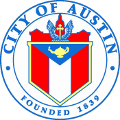Geospatial Jam Features Skill Sharing, Data Awareness
Civic hackers, GIS analysts, government officials and members of the general public came together Saturday, Feb. 22 at the University Hills Branch Library in "Austin for Code Across Austin IV: Geospatial Jam". Over 50 people attended the day-long event presented by Open Austin and the Austin Open-Source GIS User Group. The Geospatial Jam was Open Austin’s local event coordinating with the international Code Across 2014 events and International Open Data Day.
Unlike many of the Code Across and Open Data Day events, the Geospatial Jam was not a hackathon. Instead, it was a series of presentations and tutorials intended to share skills with the local community. These sessions ranged from sessions explaining geospatial data and how to do basic visualization with free tools to advanced presentations on how to develop geospatial web applications. Participants ranged from community members with a passing interest in data analysis to geospatial developers with years of experience.
All of the events took place at the Austin Public Library branch in the University Hills neighborhood, a historically African-American neighborhood in Northeast Austin. Thanks to the generosity of our sponsors, excellent food and beverage -- including lunch -- were provided to all presenters and participants. Sponsors for our local event were Google, Socrata, and Boundless. We also received support from Code Across 2014 national sponsors Microsoft, ESRI, and Code for America.
Saturday’s presentations kicked off in the morning with an introduction to geospatial data by Kelly Strickler of the Texas A&M University Transportation Institute's Austin office. She provided an overview of GIS data types, specifications needed for analysis and software used for using geospatial data. This session brought participants who may have been new to geospatial data up to speed on how the data is organized and how to use it.
A series of representatives from local and state government followed Strickler’s presentation. Maya Coleman from the City of Austin walked participants through the city’s GIS data repository and provided resources on how to request GIS files from the city. Marbenn Cayetano demonstrated the city’s open data portal and how to create views and conduct other lightweight data analysis using the Socrata platform. James Seppi of the Texas Natural Resources Information System presented state-level data available through his office and gave some insight into changes into open-data policy at the Texas government.
After lunch, Ryan Murphy of the Texas Tribune presented a roundup of tools that may be helpful to geospatial analysts and developers. As Kelly discussed earlier, there are a number of formats used for geospatial data. Various tools produce or consume their data in these formats. One challenge is converting datasets so they can be moved between tools. Ryan presented some simple tools to acquire information, to convert datasets, and do do simple mapping of data.
Two presentations offered tutorials on using web-based tools for visualizing geospatial data. Chris McConnell, a UT Austin doctoral candidate researching digital inclusion issues, showed how to map data in Google spreadsheets for lightweight visualization and analysis. Using data collected during the event, McConnell generated a Google Map showing the participation at the event by ZIP code. Then Mateo Clark, a local web developer and Open Austin volunteer, who showed how to use the online service MapBox for more sophisticated presentation online.
The last series of presentations addressed experienced developers interested in working with geospatial data. Co-organizer Sara Safavi of the Austin Open-Source GIS User Group provided insights into working with the spatialite data format, which is used in many Open Austin projects. James Seppi then returned to the lectern for a talk on the leaflet.js library used for Web presentation of geospatial data.
In the final session, Open Austin chair Chip Rosenthal facilitated a brainstorming and breakout session asking participants about next steps after the Geospatial Jam. In the brainstorming session, a variety of civic apps were proposed including a fine-grained 311 mobile application, a system for tracking public-transit vehicles, and a hybrid SPL meter tied to a 311 form for making noise complaints. During the breakout, small groups were asked to assess what populations the application might serve, what data or services it would need from government, and how it might improve existing local services.
The Open Austin Hack Team will take these project suggestions and move forward with ideas that are of interest to the group to begin developing. Anybody interested in working on one of these ideas should come to one of the monthly meetups or contact hack@open-austin.org.
Attendees posted to social media under the hashtags #geojam (our local hashtag) and #codeacross (used across all events). You can view a summary of Austin Geospatial Jam social media here.
Feedback from the event was largely positive. Many geospatial analysts and government employees were excited by the enthusiasm of the public for civic hacking and open public data. Participants new to open data and civic hacking also expressed appreciation for what they said was a well-organized and interesting event. Participation at the event was now limited to just Austin residents; people from Waco, Puerto Rico, Portugal, and Brazil were in attendance. One visitor from outside Austin was particularly interesting: Martin Ritchey, the Chief Emergency Management Coordinator for Caldwell County, Texas visited the event and shared some of the challenges related to administering services there.
Open Austin plans to continue co-presenting large public events and its monthly meetups. The next major event will be the ATX Hack for Change, which is hosted by St. Edward’s University in South Austin. Coinciding with the National Day of Civic Hacking, May 31, the hackathon brings together developers, designers, data analysts and members of civil-society organizations together to prototype applications for the public good. The next Open Austin meetup is today, February 24 and features civic hacker Thomas Levine.
Session Presenters and Materials
- Event Program
- Opening Session - Chip Rosenthal, Open Austin
- Introduction to Geospatial Data - Kelly Strickler, Texas A&M Transportation Institute
- Government Datasets Online
- City of Austin GIS Site - Maya Coleman, City of Austin
- City of Austin Data Portal - Marbenn Cayetano, City of Austin
- TNRIS Data - James Seppi, Texas Natural Resources Information System
- Data Crunching and Conversion - Ryan Murphy, Texas Tribune
- Use Cases
- Data Visualization with Google Fusion Tables - Chris McConnell, UT Telecommunications and Information Policy Institute
- Creating and Styling Maps with Mapbox/TileMill - Mateo Clarke
- Developer Tools for Database and Mapping
- Intro to spatialite - Sara Safavi, Austin Open Source GIS Group
- Intro to Leafletjs - James Seppi, Texas Natural Resources Information System
- Jam Session & Wrap-Up - Chip Rosenthal, Open Austin
The organizing committee expresses its appreciation to all the sponsors, whose gracious support allowed us to present this free event to the community, and helped make the event a great success.
(Mateo Clarke and Chris McConnell contributed to this article.)







